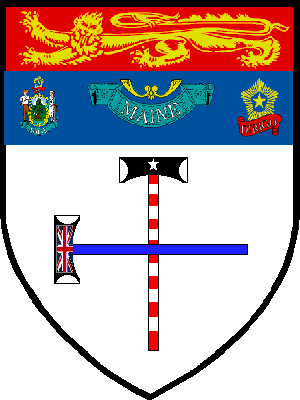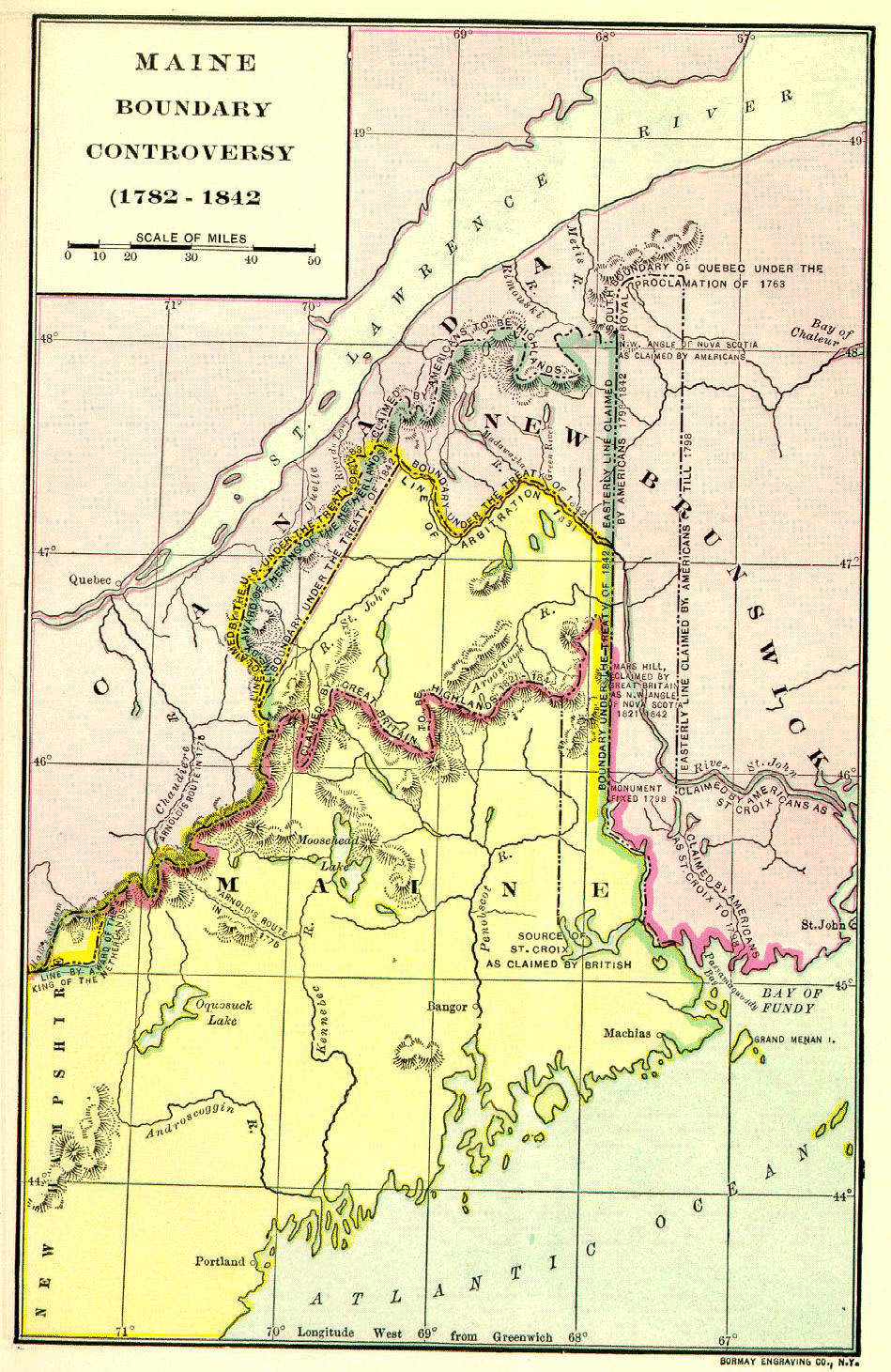![]()
|
![]()
|
Before the great gold rush, there was the lumber rush. The Madawaska territory had it, and everybody wanted it. Every sea power on both sides of the Atlantic coveted the great white pine to make the masts for their ships. From the St. John River valley south to Bangor or north and east to Canadian ports, lumber filled the rivers and flowed to the markets of North America and Europe. Because the rivers moved the lumber, control of this resource was in the hands of those who controled the rivers. These were the lumber barons of the 19th century. One of them was Joe "J.T." Michaud and his lumber farm on the Allagash River still serves as a landmark to everyone fortunate enough to pass along that spectacular wilderness in the northern corner of Maine.
The lands on the south bank of the St. John Valley would be critical in determining whose lumber mills would receive the the lumber from the vast pine forests of the region -- would the rivers flowing north into the St. John be used (favoring the Canadians), or those flowing south into the Penobscot watershed (which favored the Americans). Romain(e) Jean Michaud, a young Canadian living along the St. Laurence River at Kamouraska, had been pressed into British service against the United States during the War of 1812. He moved his family to the Madawaska region before the start of the "Aroostook War" to avoid the British. The Webster-Ashburton Treaty gave over 7,000 square miles of the disputed area, including the Aroostook valley, to the United States, and several critical waterways, including the all-important east-west passage of the St. Johns River, were opened to free navigation by both countries. The Treaty also accomplished a number of other things: it settled the U.S.-Canada border dispute in the Great Lakes region; it provided for cooperation in the suppression of the slave trade; and it arranged for a system for mutual extradition of criminals. Essentially, the Treaty served as a precedent for peaceful settlement of disputes between the United States and Canada -- a critical issue given the length of their shared border (today it is the longest demilitarized boundary on Earth - post 9/11 note: This is changing, sadly). For Romain Michaud, however, the end of the war meant opportunity. He moved his family to choice land in the Wallagrass Plantation, down the Fish River from the new Ft. Kent. His property was bounded by the Wallagrass stream, the Fish River, and the Military road, now Maine Route 11. In addition to farming his land and harvesting lumber, Romain was an entrepreneur. He ran a small store and lodging at Soldier Pond. American soldiers, and later lumbermen, traveling up the Military Road to Ft. Kent would have to pass right by his doorstep. It was a prime location and so the store stayed in the family for several generations, through his son Thomas. One of Thomas' sons decided to make his fortune in the nearby woods as a lumberman. His name was Joseph Thomas "J.T." Michaud, and he would become one of the legends of the Aroostook lumber industry. Working for the St. John Lumber Company, J.T. established a farm on the upper Allagash River, about 14 miles southwest of the town of Allagash, Maine. The Michaud Farm, as it became know as, provided grain for the workhorses and vegetables for his work crews. In addition, like his father, he ran a store for the families who lived and worked in the area. At its peak, the Michaud Farm settlement included as many as thirteen families. By the 1930s, Michaud Farm was a base camp for lumber crews working along the Allagash River. Downstream, at a bend in the river, sat a supply depot for horse-drawn towboats bringing supplies to lumbering operations at Michaud Farm. Today this site is called the Michaud Inn campsite, after a late 1800s riverside hotel that eventually replaced the supply depot. When the St. John Lumber Company failed in 1925, so did the fortunes of J.T. He was bankrupt, and lost everything except the cedar-shingle covered Michaud Inn, which he gave to its caretakers, Bill and Gertie Leslie. Eventually, it became the private residence of Clifford Brownell, and most recently, had been abandoned for years, before it burned to the ground in 1993. Michaud Farm suffered a similar fate. Most of the buildings fell into disrepair and were eventually razed as a hazard by the Park Service. Today, Michaud Farm is used as a camping and access site for canoers and the site of the only Ranger Station on the Allagash Wilderness Waterway. Faye Hafford and her husband Lee lived at the ranger station there for many years and she's written several books based on her experiences.
| ||||||||
|
Damase/Thomas MICHAUD (son of Romaine Jean MICHAUD) was born on May 5, 1839 in St. Basile, NB, and was christened in St. Brunos, Van Buren, Maine. Damase married Clarisse MADORE, daughter of Augustin MADORE and Brigitte LEVESQUE, on June 15, 1860 in Frenchville, ME. Damase and Clarisse had four children: i Joseph MICHAUD Joseph married Medee DAIGLE, daughter of Honore DAIGLE, on January 8, 1894, in Fort Kent, ME. ii Johnny MICHAUD Johnny married Delima LABBE, daughter of Germaine LABBE and Delina CYR, on September 2, 1889 in Fort Kent, ME. iii Thomas Damase MICHAUD Thomas married Nellie MARTIN. iv Edith MICHAUD Edith married Joseph GAGNON on December 22, 1886. |
|
|

![]()
HOME
|
Writing Resource Page
|
Genealogy Page
|
INDEX



